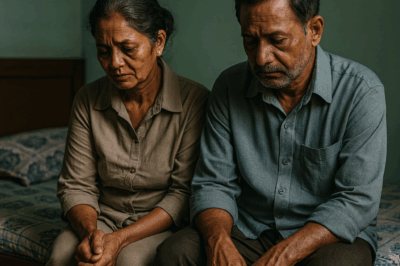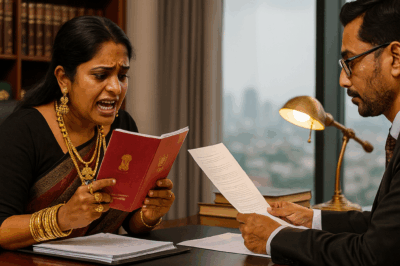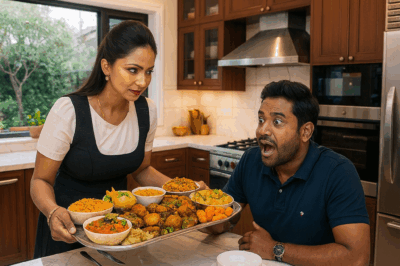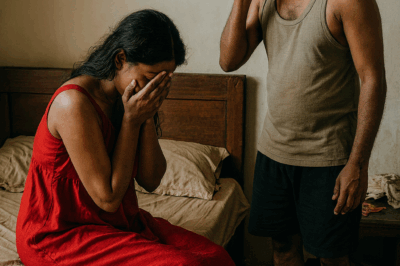The evening meal in our modest home on the outskirts of Lucknow was filled with the rich aroma of tamarind fish curry and spicy lentil stew. But the atmosphere around the table was heavy—like a stone pressing down on my chest.
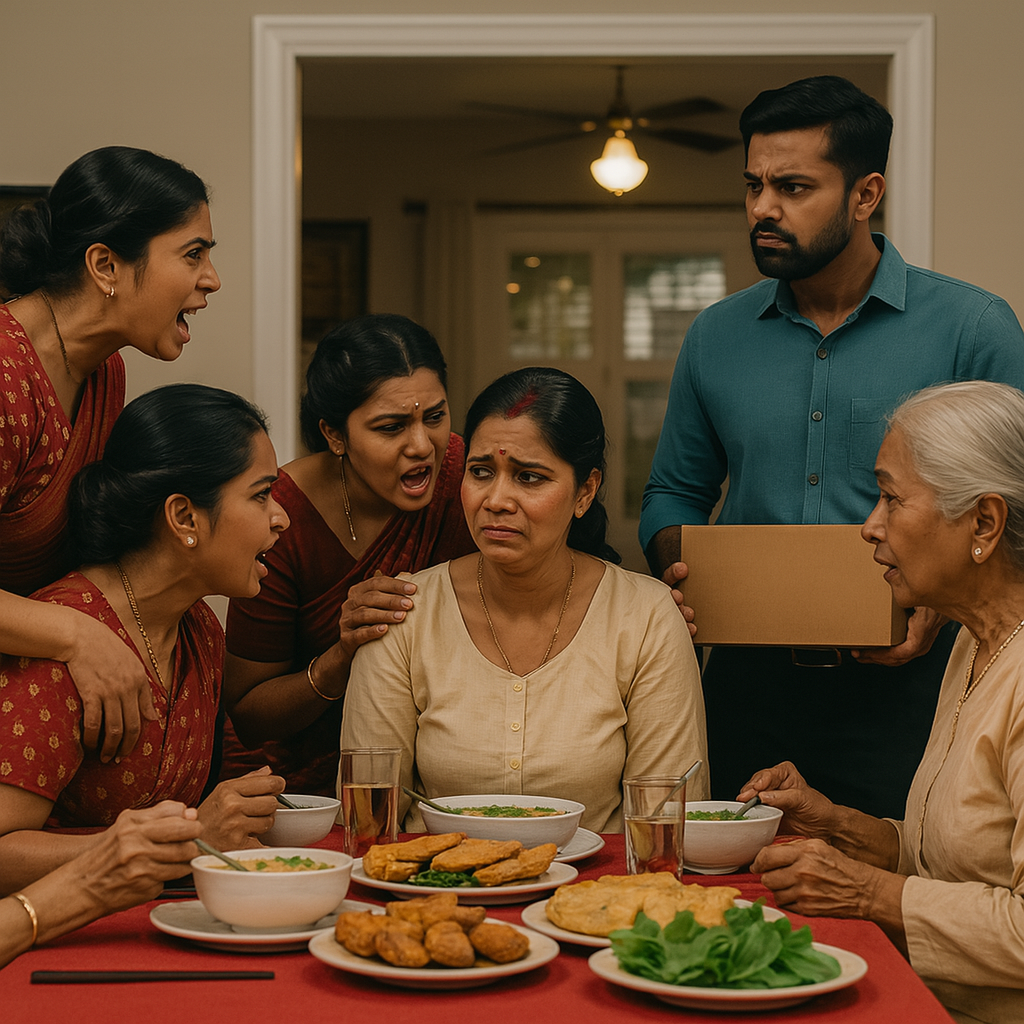
I’m Priya, 29 years old, sitting beside my husband—Aman. Across from us sat his younger sister, Meera, just 24 and known for her blunt tongue. At the head of the table was my mother-in-law, Ammaji, watching each person carefully, like studying a complicated chessboard.
Meera put down her spoon with a loud clank, breaking the silence.
“Priya, you call this a meal? And you still want to call yourself the daughter-in-law of this house?”
Her tone was sharp as glass.
“This fish curry is salty as seawater, and the dal tastes like boiled water. If you don’t know how to cook, just say so. I’ll do it for you!”
Silence fell.
Ammaji sat still, calm but unspeaking. Aman kept his head low, his hand paused in the middle of holding rice. I swallowed hard, trying to stay composed.
“I’m sorry, Meera. I wasn’t feeling well today so…”
Before I could finish, she cut me off:
“Not well? You stay home all day! What exactly are you tired from? Aman earns and feeds you, and you can’t even cook one decent meal?”
My face burned. It felt like being slapped in front of the entire family.
I wanted to defend myself, to say I also work online, that I juggle deadlines and stress too. But the words got stuck in my throat.
I glanced at Aman, hoping—pleading—he would say something. But he remained silent, staring into his plate. My heart tightened. After three years of marriage, I had never felt more alone.
Suddenly, Aman stood up.
The screech of the chair dragged everyone’s attention.
I thought he was going to leave the room—like he usually did when tensions rose.
But he didn’t.
Instead, he walked straight to the corner cabinet, opened it, and pulled out an old wooden box.
Everyone froze.
Meera frowned. Ammaji shifted in her seat.
Aman placed the box on the table. His voice was calm but firm.
“Meera, that’s enough. I need to speak up today.”
He opened the box. Inside were old, faded letters.
“These are letters Amma wrote to Papa when they were young—back when they were just married.”
Ammaji’s hand trembled slightly.
“Aman, what are you doing?” she asked softly, her voice cracking.
But Aman didn’t look at her. He turned to me—his eyes gentle, yet resolute.
“Priya, I’m sorry. I’ve been silent for too long. I know you’ve been carrying this weight, and I let you face it alone. But not anymore.”
Then he looked at Meera.
“You think Priya isn’t good enough for this family? Do you even know that Amma, too, was once scolded by Dadi for not cooking well, for being slow, for not being the ‘perfect’ daughter-in-law? These letters… they’re her apologies to Papa, and her stories of how she cried herself to sleep when Dadi compared her to the neighbor’s daughter.”
The table went completely still.
Ammaji bowed her head, silent tears slipping down her cheeks.
Meera opened her mouth, but nothing came out.
Aman’s voice softened:
“Amma endured all that because Papa loved her. And because she didn’t give up. Priya is the same. She isn’t just cooking meals—she’s bearing the pressure of this whole house.”
He turned to Meera and said:
“Apologize to her. Right now.”
Meera sat frozen, her face flushing red. Finally, she muttered:
“Priya… I’m sorry. I didn’t know…”
I looked at her, then at Aman—and the tears came. Not out of pain. But because for the first time, I felt truly seen. Protected.
That night, Ammaji asked to speak with me privately. She held my hand and said gently:
“Priya, I’m sorry. I forgot how much I once suffered. I won’t let Meera hurt you again.”
That dinner—whether salty or bland—became a memory I’ll never forget.
Because Aman didn’t just stand up to defend me.
He opened a box of old secrets that forced everyone to see the truth.
From that day, Meera became more respectful.
Ammaji softened.
And Aman and I… we found each other again.
It felt like falling in love for the very first time.
News
At 61, I remarried my first love. On our wedding night, as I took off my wife’s traditional dress, I was startled and pained to see…
I am Arjun, 61 years old this year. My first wife passed away 8 years ago from a serious illness….
30 minutes later, my sister was stunned when our family called with news:
My younger brother, the youngest in our family, is only 37. Unmarried and without children, he just bought a piece…
Thinking my stay-at-home wife was a spendthrift, I pretended to go bankrupt to teach her a lesson. To my surprise, that evening she brought dinner to the table and made an announcement that sent a chill down my spine…
I’m a businessman, and my wife, Priya, stays at home to take care of our two young children. Every month,…
In the middle of the night, a son-in-law called his father-in-law and told him to take his daughter back and “re-educate” her. 15 minutes later, the father-in-law arrived with something that left his son-in-law speechless…
It was nearly midnight, with a light drizzle falling outside. In the cold living room, the atmosphere was as tense…
On the day I found out I was pregnant, his mother brought me 20 lakh rupees and told me to break up. I took the money and left without a word. Eight months later, I fainted in the delivery room when I saw…
I never thought that the doctor who delivered my baby would be my ex-boyfriend, Rohan. The child in my womb,…
A poor young woman gives shelter to a man and his four children on a rainy night — what he does next leaves her completely shocked and stunned…
That night, the rain poured down relentlessly. A biting cold wind whipped violently against the small, dilapidated house at the…
End of content
No more pages to load

